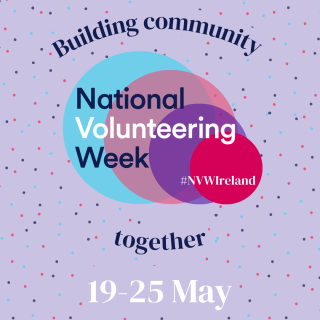National Volunteering Week 2025: Building Community Together

National Volunteering Week (NVW) 2025, taking place from Monday, 19 May to Sunday, 25 May, is a celebration of the incredible contributions volunteers make to Irish society. Organised by Volunteer Ireland in collaboration with local Volunteer Centres, this week shines a spotlight on how volunteering strengthens communities and fosters social cohesion. This year’s theme, 'Building Community Together', recognises the power of collective effort in addressing social, economic, and environmental challenges.
The Value of Volunteering: More than just numbers
Volunteering is often viewed through the lens of goodwill and community spirit. However, it also represents a significant economic and social contribution. In Ireland, approximately 648,000 volunteers work in registered charitable organisations. Their efforts, valued between €1 billion (using the minimum wage) to €2.5 billion per year (using the average income), highlight how indispensable volunteering is to the nation’s infrastructure and wellbeing. Additionally, the Community and Voluntary sector employs around 281,250 individuals, that’s almost one in every eight workers in Ireland. If the work done by these organisations had to be sourced through the open market, it would come at considerable cost to the State.
Supporting the Community and Voluntary Sector
Community and Voluntary organisations have a long history of providing services and infrastructure at local and national level, engaging across every facet of Irish society. From social inclusion initiatives to environmental advocacy, these groups provide immense resources — energy, personnel, finance, and commitment — into improving the quality of life for countless individuals. However, the sector has faced persistent challenges. Government funding, significantly reduced during the 2008–2013 recession, has not been fully restored. It is essential that Government appropriately resource this sector into the future and that it remains committed to the principle of providing multi-annual statutory funding, considering the reliance on the sector to deliver vital services. The introduction of the Charities Regulatory Authority, the Governance Code and the Lobbying Register in recent years is intended to foster transparency and improve public trust. However, it is essential that the regulatory requirements are proportional to the size and scope of organisations, and do not create an unmanageable administrative burden, which detracts from the core work and deters volunteers from getting involved.
The Role of Programmes and Partnerships
Initiatives like the Community Services Programme works to tackle disadvantage by providing supports to community-based organisations that enables them to deliver social, economic, and environmental services, with a particular focus on areas that, by virtue for geographical isolation or social isolation, have too low a level of demand to satisfy market led providers. The groups in receipt of these services may not otherwise have any access. Furthermore, Public Participation Networks (PPNs), established in 2014, have become key facilitators of community voice in local governance. With over 19,063 member organisations by the end of 2023 and 926 elected representatives on more than 343 local committees, PPNs empower communities to engage meaningfully in policymaking, build capacity, and foster collaboration.
Thus, Social Justice Ireland recommends the sector to be resourced in a way that recognises the important role of the Community and Voluntary Sector, the local role of the PPNs, and the challenges of community development, and seeks to generate real partnerships between communities and agencies.
Recognising All Work: Beyond Paid Employment
A broader conversation is also needed around what constitutes "work." A major question raised by the current labour-market situation concerns assumptions underpinning culture and policymaking in this area. The priority given to paid employment over other forms of work is one such assumption. Most people recognise that a person can be working very hard outside a conventionally accepted ‘job’. Much of the work carried out in the community and in the voluntary sector comes under this heading. So too does work done in the home. Social Justice Ireland’s support for the introduction of a basic income system comes, in part, because it believes that all work should be recognised and supported.
Social Justice Ireland believes that the new government should recognise, in a more formal way, all forms of work. We believe that everyone has a right to work, to contribute to his or her own development and that of the community and wider society. We also believe that policymaking in this area should not be exclusively focused on job creation. Policy should recognise that work and a job are not always the same thing.